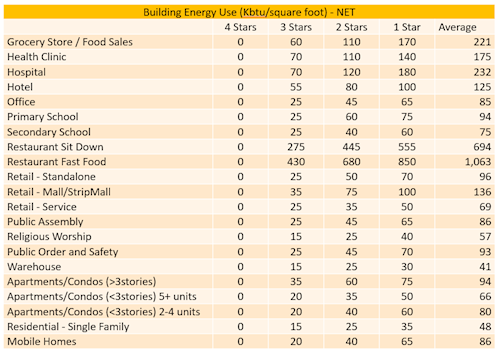

Our aim is to recognize local entities leading on climate and clean energy. We have nine recognition categories for businesses, nonprofits, and local governments. Whatever climate action you are taking, we want to applaud your efforts!
Within each category you will find a description of our award criteria, a sample of the application form. Recognition is based on your organization's performance over a recent twelve month period of your choosing. Additional award guidelines are here.
This category recognizes buildings that use less energy per square foot than a typical building. This metric, energy use per square foot, is often called energy use intensity (EUI). Because different kinds of buildings have different levels of energy use intensity, we base the recognition level on the type of building. To earn 4 stars a building must be net zero energy, and a building that is at least 25% more efficient than typical building of that type can earn 1 star. The chart below provides energy use intensity data for various building types.

Note that this category is net building energy usage, which means that if a facility has on-site solar, the calculation takes that into account, reducing the total electric consumption. This category does not recognize Renewable Energy Credits or carbon offsets, though you can claim credit for those efforts in the Net Emissions category.
Download a sample copy of the Energy Use Climate Champions application form to for details about how to apply for recogniton in this category. Note that the application is set up to apply for recognition of one building at a time.
If your organization owns one or more vehicles you can receive recognition for having a clean energy fleet. Right now the typical fleet is 100% gas and diesel. We want to recognize entities converting to electricity, renewable natural gas, and biodiesel because each of those alternatives reduce emissions.
For these awards we are defining clean energy vehicles to include:
Download a sample copy of the Fleet Climate Champions application form to see what details are required to apply for recogniton in this category.
Organizations can have a big role in influencing how their employees get to and from work. At present, in Dane County about 73% of people drive alone to work. We are recognizing entities that have successfully encouraged employees to shift to cleaner commuting options and we are recognizing entities that are making it easier for their employees to shift to clean and active modes of transit. The chart details the two ways you can earn recognition in this category.
Here we are measuring the typical way an employee commutes. Acceptable alternatives to driving alone include:
Entities also earn credit for offering amenities that encourage fewer single-occupancy vehicle miles, such as:
*If your organization started allowing employees to telecommute during COVID-19 and you intend to continue that practice after the pandemic ends, you can consider this amenity met.
Download a sample copy of the Employee Commuting Climate Champions application form to see what information is required to apply for recognition in this category.
Sustainably managing water resources is critical in mitigating and adapting climate change impacts. Distributing and treating water across Dane County requires significant energy, and protecting it as a basic right for all residents is a top priority. Entities are recognized in this category by completing two or more of the following sustainable water actions:
Download a sample copy of the Water Saving Practices Climate Champions application form to see what information is required to apply for recognition in this category. Applicants must include photos of at least two of the activities they report.
For this Climate Champions category, we’re recognizing organizations that divert waste from landfills or incinerators and focus on waste reduction, reuse, composting, and recycling. In this Climate Champions category we recognize entities that strive for Zero Waste as defined by “the conservation of all resources by means of responsible production, consumption, reuse, and recovery of products, packaging, and materials without burning and with no discharges to land, water, or air that threaten the environment or human health” (Zero Waste International Alliance).
Manufacturing and distributing products and materials used in our everyday lives and in the workplace take substantial energy and natural resources. Understanding an organization's waste stream provides valuable insight into operations and potential areas for efficiency.
Entries to this category will be evaluated based on Waste Diversion Rate (WDR). WDR represents how much waste is diverted from traditional disposal methods (incinerators or landfills). Below is the equation and ranking system for evaluation:

Each organization must, at a minimum, establish baseline waste generation and diversion rates thr
Resources referenced in the application for this category include:
Download a sample copy of the Waste Diversion Practices Climate Champions application form to see what information is required to apply for recognition in this category.
We will recognize farmers and land owners for climate-friendly practices associated with both dairy and crop farming. Our focus is on a) dairy operations that are transferring manure to digesters, which beneficially impacts methane emissions as well as groundwater, and b) croplands that are converted to continuous cover crops or grasslands, which has substantial benefits for the soil in addition to sequestering carbon emissions.
Download a sample copy of the Agricultural Practices Climate Champions application form to see what information is required to apply for recognition in this category.
As is the case with other categories, we expect the practices recognized in this category to expand over time. If you have ideas for additional practices we should recognize, please email us.
A variety of vendors and contractors help individuals and businesses choose climate-friendly options so this year we created a new category, the Catalyst Climate Champion, to recognize the various partners helping individuals achieve a clean energy future. Our aim is to recognize the businesses that help customers choose:
In this new category in 2021 we are going to measure both the level of effort entities put into promoting clean energy options and their level of success.
Download a sample copy of the Catalyst Climate Champions application form to see what information is required to apply.
As is the case with other categories, we expect the practices recognized in this category to expand over time. If you have ideas for additional practices we should recognize, please email us.
We want to recognize entities that are making progress reducing their total greenhouse gas emissions. For this category we again compare entities to peer organizations using the Cool Carbon Network business calculator. When you enter basic information about your organization into the calculator it generates a ‘typical’ emission profile and enables you to compare your specifics--energy usage, fleet, employee commuting, supplies--against a typical similar organization.
In this category we’ll recognize entities that have lower emissions than their peers, either based on the Cool Climate Calculator or based on other sustainability reporting.
The Cool Carbon tools are the most peer-reviewed carbon calculators in the United States. Businesses can enter their location, kind of business (e.g., bakery or insurance company), annual revenues, and number of employees to see a ‘typical’ carbon footprint for that business. And if your organization purchases renewable energy credits or carbon offsets you will be able to document that in the calculator.
Download a sample copy of the Net Carbon Emissions Climate Champions application form to see what information is required to apply for recognition in this category.
Possibly your organization has achieved significant climate success in an area not covered by the six categories listed above. If that’s the case we invite you to describe what you’ve accomplished here. In your description be sure to include:
We are accepting applications now through Monday, November 8, 2021 at 5 pm.
The Office of Energy & Climate Change will review all submitted applications and notify applicants of their status on an ongoing basis.Typically you will hear from us within 2-3 weeks of your submission. We anticipate celebrating new Climate Champions on a regular basis throughout 2021.
The Office of Energy & Climate Change may contact applicants to verify data submitted. In some cases we might ask applicants to supply documentation for the data submitted.
Climate Champions will receive official recognition for their efforts, including signage they can post in their facility. We will also recognize Climate Champions on a map of successes in Dane County.
Entities that are out of compliance with Dane County regulations may be ineligible to receive the Climate Champion designation.
If you have questions, email oecc@danecounty.gov.